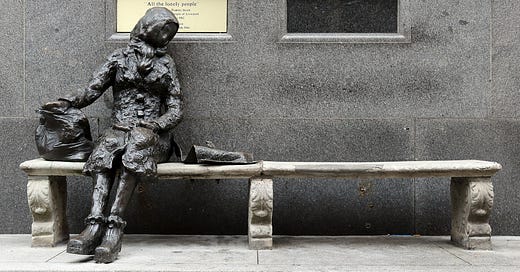
I was in my car with a Spotify playlist running through the speakers. It was a list that identified a style or genre, and then played what the algorithms suggested you might like. I was taking musical chances.
But the next song was no chance. For me, it had always been the most hauntingly beautiful song in the history of popular music.
“Eleanor Rigby” is more than a song. It represented a shift for the Beatles. It represented a shift in pop music, in the depth of songwriting, in the culture of what we all saw as standard musical subject matter.
In 1966 who wrote songs about lonely church ladies?
There had been plenty of sad songs, certainly. But not songs about such desolation and depression. And who constructed rock/pop songs with no drums, no guitars, only a double string quartet that produced immensely somber and funeral-like tones?
The list making of what may be the greatest songs ever written is never ending. Hundreds of them are easily found through an internet search. They inevitably include several Beatles songs: “In My Life” and “Let it Be” tend to always make the cut. Then there is the Beach Boys’ “God Only Knows” and Dylan’s “Like a Rolling Stone.” John Lennon’s “Imagine” shows up. And the Rolling Stones’ “Gimme Shelter.” The “Sound of Silence” is another.
A “greatest song” is a combination of key elements. Lyrics and music, have to be both enigmatic and also complementary. They must work together like other songs don’t. Also, the song must be one that signifies a change in music, a shift that is unexpected, maybe takes a chance. And there is the element of longevity. “Great” does not come without the element of time. It must sit and breathe for years to earn its forever impact.
And, for me, it has to tell a story.
Storytelling in music is the mark of magnitude. Think Dylan’s “Tangled Up in Blue” or Tom Waits’ “Christmas Card from a Hooker in Minneapolis.” Joni Mitchell’s “Coyote” or “A Case of You.” Or “1952 Vincent Black Lightning” by Richard Thompson. Even Bobby Gentry’s “Ode to Billy Joe” which sparked an entire generation to wonder what was thrown off the Tallahatchie bridge.
And then there is “Eleanor Rigby,” a story of utter loneliness with remarkable characters. Eleanor herself and Father McKenzie, “darning his socks in the night when there’s nobody there.” Combine the story with a haunting melody and evocative strings and you’ve got greatness. Maybe greatness unmatched.
The Spotify playlist carried on as I drove—Dylan’s “Ballad of a Thin Man” and John Cale’s version of Leonard Cohen’s “Hallelujah,” a song even Cohen had said was a mystery to him, never understanding the meaning of his own lyrics.
And then, a surprise.
Shane MacGowan had died a day before, the singer and songwriter for the Folk/Punk group The Pogues. Maybe hearing his “A Pair of Brown Eyes” on this playlist wasn’t that unusual, considering MacGowan’s recent death. Either way, there it was, a punch to my emotional gut.
Shane MacGowan had many issues—drugs, drink, fights, a man of excess and distain for authority, of irrepressible appetites. Yet he was a lyricist renowned by the greats: Dylan, Springsteen, Bono. “A Pair of Brown Eyes” is his masterpiece. A song about lost love and regret. A man remembers an evening with a girl he was deeply in love with and the intense warmth in her brown eyes. After the war, he tries to locate her everywhere, though he never finds her and faces the bitter truth that she is gone.
The song made me cry. Maybe yet another element of greatness.
When I got home, I found a post on LitHub about MacGowan’s lyrical brilliance, a website dedicated to literature that gave praise to a punk artist.
“Eleanor Rigby” is still the greatest song ever written. But MacGowan’s work cannot be ignored. And maybe for those of us looking for that “pair of brown eyes,” MacGowan’s punk ballad is the greatest song ever written.




I think I have to go with my current favorite which The Heart of Saturday Night by Tom Waits as performed by Diana Krall. It too is ultimately about loneliness and unfulfilled expectations. It takes me back to anticipated weekends, meeting buddies and carrying on only to be left with disappointment, too much beer, and not enough sleep. A beautiful metaphor for, dare I say it, life itself. Best line is "Is it the crack of the pool balls? Neon buzzin'? Telephone's ringing it's your second cousin." Gets me every time. And I can't separate the song from Krall's performance and arrangement. I like it much better than Waits' own. Much like it's difficult to mention the song Elinor Rigby separate from the recording.
Thanks for this, David. So much of my late teens and 20s were wrapped up in The Pogues. I have taken Shane‘s death much harder than I expected, especially since it’s been years since I’ve listened to the band. I’ve been surprised & pleased by the tributes coming from corners I never expected. Like so many, I raised a parting glass to him earlier this week. He was, indeed, a man you don’t meet every day.